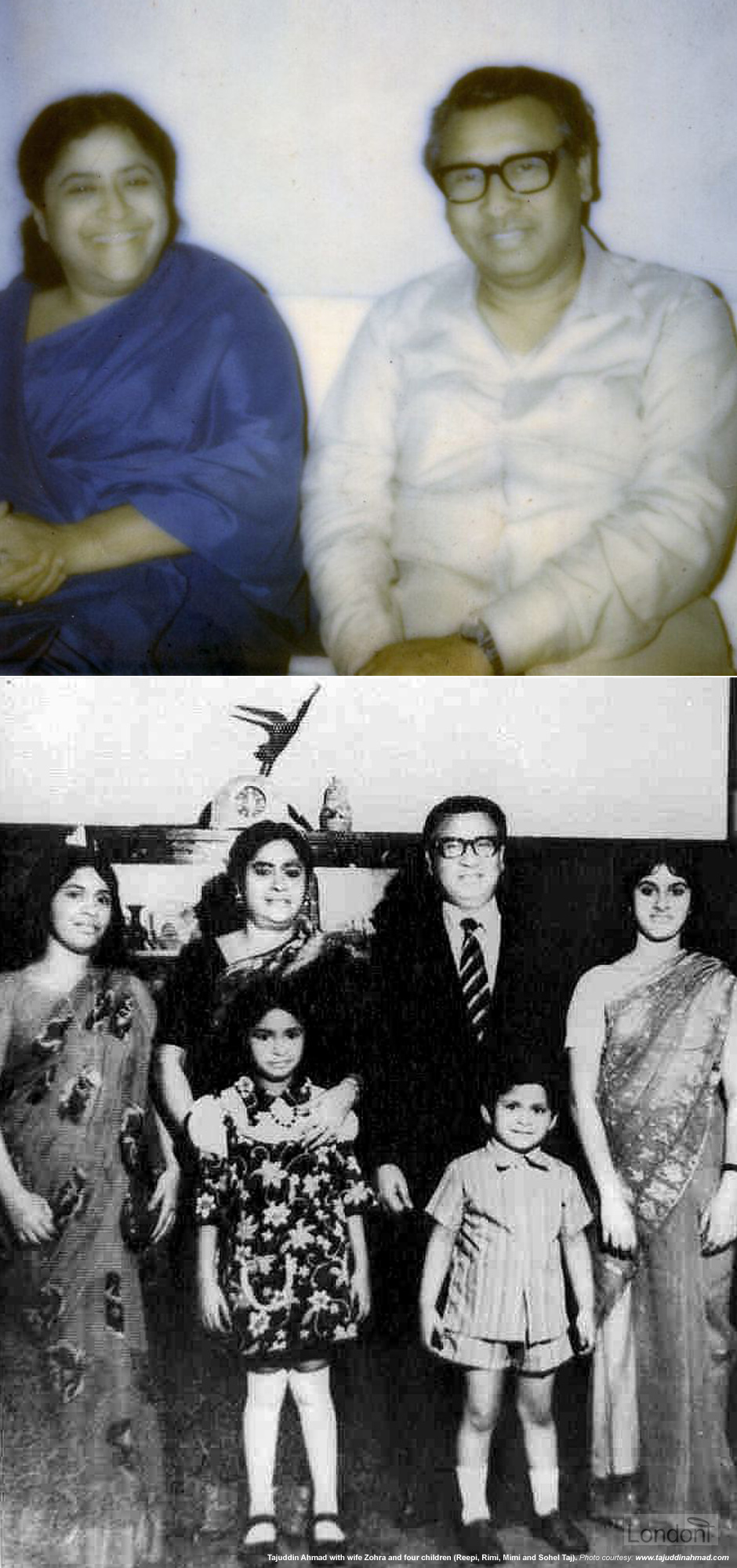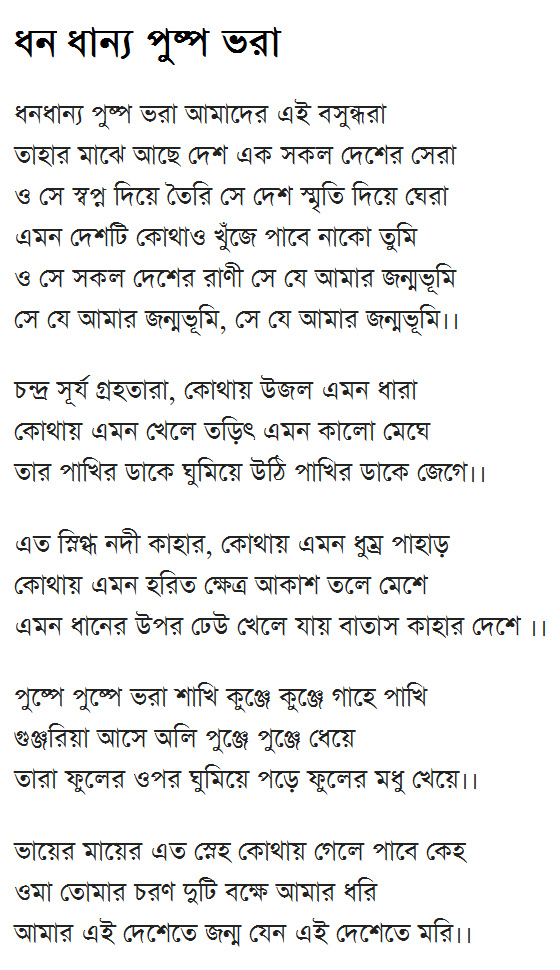
Family
Last updated: 10 October 2017 From the section Tajuddin Ahmad
On 26 April 1959, few years after graduating in Economics from Dhaka University, Tajuddin Ahmad married Syeda Zohra Khatun (nicknamed 'Lily'). He was nearly 34 years old and she was 26. Zohra's father was a professor of Arabic and English literature. He was a very knowledgeable man and a philosopher.
Zohra, who later came to be known as Syeda Zohra Tajuddin, proved a great companion for Tajuddin during his eventful life. She was a politically conscious and sensitive person. The pair inspired each other to continue to struggle for freedom and democracy at a time when all this seemed impossible. The couple went on to have 3 daughters and a son: Sharmin Ahmad (Reepi), Simeen Hussain (Rimi), Mahjabeen Ahmad (Mimi), and son Tanjim Ahmad (Sohel Taj).
Reepi grew up to become a human rights activist and writer, Rimi became an Awami League MP for Gazipur-4 constituency in 2012 while Sohel Taj became a State Minister for Home during the erstwhile Grand Alliance Government in 2009.
Since my teens I used to wear white saree. I would wonder if my future husband wouldn't like my white cloth. I had that worry within myself. After marriage I found that he also liked white clothes a lot. Tajuddin asked me what I intend to wear during my marriage. He said his mother had made some gold ornaments. I told him I didn't wear gold ornaments. He then asked what I intended to wear, I said garlands of bheli phul'er [jasmine] flower. Then it was with jasmine flowers that our marriage ceremony took place. I found that Tajuddin liked this simple and plain behaviour a lot. I gradually began to know him.
Tajuddin and Zohra were married with flowers. At Zohra's request Tajuddin bought ornaments for her wedding made of fresh jasmine flowers. Gold jewellery as was customary for the bride to wear during her wedding were abandoned in favour of a higher valued floral jewellery. Finally, Tajuddin found an ideal life partner in Zohra.

Character
An honest, loyal, disciplined, organised, hardworking, no-nonsense, charismatic, passionate Bengali
Mr. Tajuddin was extremely skilful in analyzing a subject in every little detail, and looking at all of its ramifications. He had an excellent grasp of issues and ideas, and a rare gift of making them crystal clear to others. Which is why we would never have a real serious discussion until Mr. Tajuddin was there. It was mostly through those meetings that I came to know him personally. Until that time he was just a name I had heard of, never met him. It was through these meetings that I realized the scope of this man's abilities, and how dedicated he was to his work. He was the model of professional efficiency. If he was holding a position on some issue that was contrary to ours, he would cite texts and references to give a convincing argument in support of his position.
...He was a formidable workhorse. His patience was unbelievable. A tolerant man, and an approachable person. Day after day we would be talking, arguing, agreeing on something, disagreeing on others. He was a great listener. If he disagreed with someone he would not just brush him off, rather say: "Let me hear you out first, then I'll tell you why I cannot agree with you". It was during these times we could see the depth of his knowledge. His handwriting was a thing of beauty, like an expert calligrapher. It was a joy for me to watch the articulate manner in which he would present an argument. His system was to first write down the points on a piece of paper, then deal with them in a precise surgical manner. This surely was an extraordinary gift of his. The meeting over, decisions taken, everyone gone home, and here was Mr. Tajuddin toiling away writing everything down in clear legible scripts, in coherent chronological order for everyone to have a clear idea at a glance. I would say anyone who knew him personally wouldn't hesitate to acknowledge these exceptional qualities of Mr. Tajuddin, no matter what other impressions he/she may have about the man. I was one of his greatest admirers.
Nurul Islam, former Deputy Chair of the First Planning Commission of Bangladesh
He had a very neat calligraphic style of writing. His decisions would always be written in beautifully crafted clear Bengali sentences. He took utmost care in keeping his files in perfect order. He was keenly aware of the historical significance of official files, which explains why he was so picky about not having any room for error in them. Sometimes I'd alert him to a certain file: "Sir, I think there is a problem here. I bet once it leaves this office, it will never return, or will, with extreme caution, even if it does. I think it should be sent to the Investigation Department". Mr. Tajuddin was an extremely intelligent man, and a very sharp nose for things that might go wrong. And yet he never questioned my judgment. He trusted my instincts completely. And, by the grace of God, no one ever found anything in his files that might embarrass him in any way.
There was one thing about Mr. Tajuddin's personality that whenever and wherever in the world he went on a tour he would make an impression on the other side by his wit, intelligence, depth and simplicity, they'd look visibly taken by his charm. He had a gift for putting his arguments in a very convincing manner.
Mr. Tajuddin was not to be taken in easily by unnecessary adulations. In fact, he used to loathe flattery. If anyone came to his office trying to gain his favour by empty words of flattery, there were times when I saw the person thrown out. Overt praise just to get things done wouldn't work with this man. He'd be immediately cut off by Mr. Tajuddin, and asked: "Just say what you came to say. There is no need for the other things, you may utter those words somewhere else". People, of course, knew what a disciplined man he was, so hardly anybody who knew him tried that approach.
Once I was confident that he was not the kind of boss who would do any harm to me I took the liberty of confronting him, if I felt necessary, with sharp critical comments. He'd encourage me to make those comments by saying: "Mr. Choudhury, please do not try to hide anything from me just because it may not be very pleasant. You must tell me frankly and bluntly what I need to know". My response to that was: "Sir, the kind of stuff you allow me to say to you would be enough to get myself fired for insubordination, had I been working with somebody else. You have given me that freedom so why shall I hide anything from you!"
What a strange man he was that he appreciated the criticisms more than the compliments!
Abu Sayeed Choudhury, private secretary of Finance Minister Tajuddin Ahmad (1972-1974)
One thing about Mr. Tajuddin separated him from others - he had a lot of opportunities to live very comfortably, yet he led a very austere and simple life. His household furniture consisted of an ordinary wooden charpoy, a cheap three-and-a-half-taka mosquito net loosely nailed against wooden supports; a pillow, a mat, a cotton quilt and a sheet of cloth. That's all he needed for a good night sleep - which generally meant 2 hours, from 2 in the morning till 4, and no more. Of the remaining 22 hours as much as 20 were for his official duties - meeting foreign dignitaries, field-workers, correspondents, reporters, diplomats, in addition to sending off daily instructions to various segments of his government in exile, plus frequent visits to field operations in different spots. This man's capacity to work was simply unbelievable. He didn't smoke, didn't drink, and didn't crave for any little vices or weaknesses. Never had the slightest interest in a member of the opposite sex, except on strictly business terms.
Tajuddin Bhai was a living example of the words 'discipline' and 'efficiency'. Every little file that ever crossed his desk received the utmost care and attention by him, no matter how important or how insignificant they were. His capacity for clear analysis and quick judgment was phenomenal. There was nobody in the whole country who could come close to match his intellectual abilities.
Ali Tareq, lawyer and politician was the Public Relation Officer of Finance Minister Tajuddin Ahmad (1972-1974)
What were the leadership qualities of Tajuddin? He was an intelligent person, and yet very close to the masses. Born in a middle-class rural family, he could feel the pulse of the peasants and small artisans. At the same time, he studied economics and had acquired all the qualities of a modern intellect. His involvement in organisational activities gave him an extra edge over others in dealing with ordinary people as party workers, and at the same time running a multi-class party under the guidance of the charismatic leader Sheikh Mujibur Rahman.
Atiur Rahman, economist
Animal and nature lover, anti-smoke campaigner and clean life advocate
Tajuddin Ahmad loved animals and nature. As a youngster Tajuddin would go fishing at the Shitalakya nodi with his friends. He also enjoyed tending the cattle and loved to take care of plants.
The family had a dog named 'Peepi' (to rhyme with the girls nickname Reepi, Rimi and Mimi). While imprisoned on one occasion, Tajuddin saw a dream in which he saw Peepi was hurt and wounded in one eye. He wrote a letter to his family mentioning the content of the dream and enquired about the dog, asking his family to take care of her. But, before the letter could reach the family, they visited Tajuddin in prison where he told them about the letter. Once again he asked them to take care of the dog.
By the time the family returned home, the letter had arrived. Few days later they saw the dog. And just like Tajuddin had dreamt, it had a wound on one eye!
This story highlights the humanity and soft, loving nature of Tajuddin Ahmad. Even during his difficult period, he still considered the wellbeing of others - even an animal.
His love for animals was so much so that when the baby birds were born he would place baskets filled with soft cottons under the nests to protect them from injury from falling to the ground.
His love for animals persisted throughout his adult life. When a Bulbul (Nightingale) which made a nest in an outdoor hanging plant died in a storm he wept and grieved. He would shelter stray dogs from the street and join his daughters to play with them.
Tajuddin was a teetotaller throughout his life and as a teenager started an anti-smoking campaign to warn people about the danger of smoking. This was a brave and unusual move for person to undertake in a country where having a biri (cigarette) was the cultural norm. Today we understand the great harmful effect of smoking, however, back then cigarette played an important part in socialising. Two strangers could offer each other a cigarette and 'break the ice'. Therefore, for Tajuddin Ahmad to take up an anti-smoking campaign proved that he was ahead of time and not scared to do the right thing.
Favourite song
Tajuddin was a passionate and proud Bengali. His favourite song was "Dhono Dhanne Pushpe Bhora" (Enriched with crops and flowers) composed by Bengali Hindu poet, playwright, and musician Dwijendralal Ray (also known as D. L. Ray) from Krishnanagar in West Bengal. It is a song which praises the Bengal motherland and was very popular as a muktir gaan (liberation song) amongst the freedom fighters and general public during the 1971 Bangladesh independence war.
"Dhono Dhanno Pushpe Bhora" kobita by Dwijendralal Ray (aka D. L. Ray)

